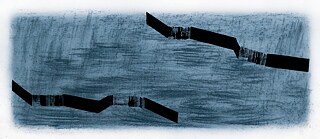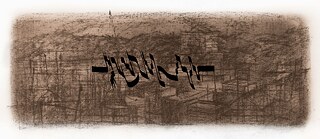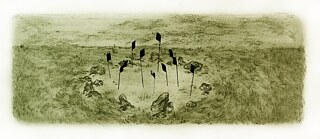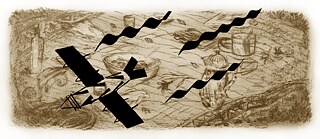The Magic Border
It was on a cold and rainy day in Kabul that I found myself floating in delicate harmony with my identity, art, and life. The conflicting aspects of my identity had at last found a balance and it had occurred just like that, like an uninvited wind. As it rained, I watched Kabul slowly emerge from behind the thick dust. I was sitting on the marble stairs of the Queen’s Palace staring at the mountains. The bright colours of houses on the mountainside had turned the city from a tired and ragged beggar to a young impatient lover.
I was among the top ten artists selected for the Afghan Art Prize in Kabul. We were at the Queen’s Palace in the Bagh-e-Babur, or Babur's Garden, to install our art works for the exhibition. The moments were drunk with joy and satisfaction. I felt I had completed the struggle to become an artist at last. The chance that was never given to me in Iran happened in Kabul. I thought the rest would be easier.
I found myself at peace, at rest, not knowing precisely when that moment of rest had arrived. It might have happened in the market, surrounded by the smell of fish. Or come attached to the voice of the popular Afghan singer Ahmad Zahir that reverberated in the distance, between me and an explosion. It could have sneaked in when I was drinking my ready-made coffee sweetened with two full spoons of sugar, listening to an art history session arranged by my friends.
I was redefined and reshaped in Kabul as if I had been melted and poured into a different mould; a mould I worked hard to make. Although the concept of life was in constant change, I was so comfortable with the new self that I couldn’t fit into my previous mould in Iran - of an Iran-born Afghan refugee.
The first time I crossed the border into Herat, I had documents proclaiming that I was a refugee born in Iran who lives with her family in Mashhad. A couple of days later when I crossed the same border to go home, my documents denied the past and proclaimed that I was an Afghan citizen, entering Iran alone on a student visa. It seems strange now, but it was normal then. Normal for Iran-born Afghans determined to go to university. As refugees, we were not entitled to an education, or to employment. To study in Iran we had to give up our refugee status in Iran, leave the country, then apply for a student visa, returning as Afghan students to Iran.
This magic border reshaped and re-appropriated the family history of thousands. After graduating from university, I stood in the line at the border again and received a red stamp declaring my permanent exit.
Home is a cubit space outlined by four white walls. The space carries the voice of Nana (meaning 'mother' in my mother-tongue) waking everyone up for breakfast early in the morning before the sun spoils the freshness hanging in the air.
The delicate balance I felt at the Queen's Palace in Kabul was a rare moment of equilibrium in all these crossings. Sitting on a black chair in my studio in London, I know that it is gone now.
As I write this, I get the news that the Taliban has taken control of the border between Iran and Afghanistan/ Herat and Mashad- the same magic border I crossed as a student. I listen to the residents of Herat describing the situation on the social media app, Clubhouse. Herat is under siege, the Taliban has blocked the route to the airport. Before this, provincial capitals across the country had been controlled one after another by the Taliban. With these changes, hope has been fading into the shadows - not just for the residents of Afghanistan but also for Iran-born Afghans who decided to go to university so they could work and live with dignity in Afghanistan.
My sister is on the phone from Iran. Her wavering voice is paralysed with the question: is there any point in continuing her studies in Iran? “Is it worth the money?” she asks. I sense a sad subtle grin on her face when she adds: “I thought I might be able to teach at Kabul University if I do my master’s degree here.” I was not able to tell her that at least she is safe in Iran because I am aware that the loss of hope can be as deadly as war. For many of us, returning to Afghanistan was the only way out of our predetermined fate in Iran.
For Iran-born Afghans like me who pursued their education despite desperate financial constraints and the systematic discrimination they faced in Iran, rebuilding Afghanistan was one of our main aspirations. Now with the Taliban gaining ground each day in Afghanistan, the hope of returning is fading away, like the image of Kabul seen on that rainy day.
— August 2021
I was among the top ten artists selected for the Afghan Art Prize in Kabul. We were at the Queen’s Palace in the Bagh-e-Babur, or Babur's Garden, to install our art works for the exhibition. The moments were drunk with joy and satisfaction. I felt I had completed the struggle to become an artist at last. The chance that was never given to me in Iran happened in Kabul. I thought the rest would be easier.
I found myself at peace, at rest, not knowing precisely when that moment of rest had arrived. It might have happened in the market, surrounded by the smell of fish. Or come attached to the voice of the popular Afghan singer Ahmad Zahir that reverberated in the distance, between me and an explosion. It could have sneaked in when I was drinking my ready-made coffee sweetened with two full spoons of sugar, listening to an art history session arranged by my friends.
I was redefined and reshaped in Kabul as if I had been melted and poured into a different mould; a mould I worked hard to make. Although the concept of life was in constant change, I was so comfortable with the new self that I couldn’t fit into my previous mould in Iran - of an Iran-born Afghan refugee.
Home is a hostage, unreachable, and trapped by borders on the outskirts of Mashhad in Iran. A mere six hours away is the city of Herat, my first encounter with Afghanistan.
The first time I crossed the border into Herat, I had documents proclaiming that I was a refugee born in Iran who lives with her family in Mashhad. A couple of days later when I crossed the same border to go home, my documents denied the past and proclaimed that I was an Afghan citizen, entering Iran alone on a student visa. It seems strange now, but it was normal then. Normal for Iran-born Afghans determined to go to university. As refugees, we were not entitled to an education, or to employment. To study in Iran we had to give up our refugee status in Iran, leave the country, then apply for a student visa, returning as Afghan students to Iran.
This magic border reshaped and re-appropriated the family history of thousands. After graduating from university, I stood in the line at the border again and received a red stamp declaring my permanent exit.
Home is a cubit space outlined by four white walls. The space carries the voice of Nana (meaning 'mother' in my mother-tongue) waking everyone up for breakfast early in the morning before the sun spoils the freshness hanging in the air.
The delicate balance I felt at the Queen's Palace in Kabul was a rare moment of equilibrium in all these crossings. Sitting on a black chair in my studio in London, I know that it is gone now.
As I write this, I get the news that the Taliban has taken control of the border between Iran and Afghanistan/ Herat and Mashad- the same magic border I crossed as a student. I listen to the residents of Herat describing the situation on the social media app, Clubhouse. Herat is under siege, the Taliban has blocked the route to the airport. Before this, provincial capitals across the country had been controlled one after another by the Taliban. With these changes, hope has been fading into the shadows - not just for the residents of Afghanistan but also for Iran-born Afghans who decided to go to university so they could work and live with dignity in Afghanistan.
My sister is on the phone from Iran. Her wavering voice is paralysed with the question: is there any point in continuing her studies in Iran? “Is it worth the money?” she asks. I sense a sad subtle grin on her face when she adds: “I thought I might be able to teach at Kabul University if I do my master’s degree here.” I was not able to tell her that at least she is safe in Iran because I am aware that the loss of hope can be as deadly as war. For many of us, returning to Afghanistan was the only way out of our predetermined fate in Iran.
For Iran-born Afghans like me who pursued their education despite desperate financial constraints and the systematic discrimination they faced in Iran, rebuilding Afghanistan was one of our main aspirations. Now with the Taliban gaining ground each day in Afghanistan, the hope of returning is fading away, like the image of Kabul seen on that rainy day.
— August 2021






